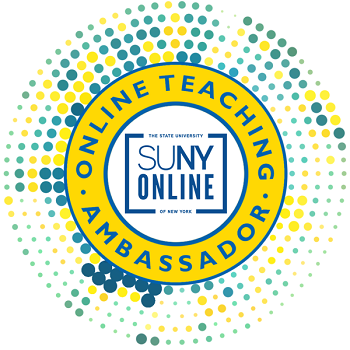SUNY Online Teaching Ambassador 2022: Oswego – Sandy Bargainnier

SUNY Oswego
Sandy Bargainnier is a full professor and former department chair in the Department of Health Promotion and Wellness at SUNY Oswego. She developed both the residential and online BS degrees in Wellness Management. She was also a key player in developing the new online degrees (BA/BS) in Integrative Professional Studies (IPS) and serves as the current Program Coordinator. She is a recent recipient of the President’s Award for Excellence in Faculty Service and the President’s Award for Excellence in Academic Advising. Sandy earned a BS from Lock Haven University, MS from the University of Rhode Island and an Ed.D in Curriculum and Teaching from Boston University. Bargainnier primarily teaches online undergraduate and graduate courses in the major. Most recently, she is teaching the introductory and capstone courses for the new Integrative Professional Studies degrees, focusing on the many futures of work.
Good course design, navigation, and content accessible to all are crucial to student learning. As a curator of content, I use content from books, articles, government websites, LinkedIn Learning, Khan Academy, Crash Course, and Ted Talks. In addition, I try to align readings with video. There is so much accessible content online that I can spend more time designing learning activities and assessments and less time developing content. Although, it is essential to start and end each module with a summary and instructor engagement, preferably in a video format and in less than 10 minutes.
First and foremost, I strive to make all assignments meaningful and relevant to the learner. Once I spark their interest, I then have them apply this new knowledge to their work or life goals if at all possible. As a result, students seem to have more buy-in to new concepts when relating them to their lives. My courses require a great deal of writing. All discussion posts, replies, and papers must be formally written, cite assigned course materials, and adhere to either APA or MLA citation styles and assigned word counts. Journal writing, which I also use, can be more informal.
Since writing is in each module, I always have an analytic rubric that defines the grading criteria. I also try to have examples of coursework showcasing differing levels of quality. Providing rubrics and work samples makes grading more manageable for me. In addition, the rubric helps differentiate student performance levels, thus fewer questions and confusion. Finally, one of the essential strategies to good online learning is instructor presence. I make sure I have my “soft touches” each week, so students know I am there, listening, reading their posts, and engaging with the material as well. These soft touches can occur through announcements, a brief instructor video, course messages, or individual feedback on student discussions. Students need to know that I am there and care about their learning. This, along with sound pedagogy, can go a long way and make all the difference in online learning.





























